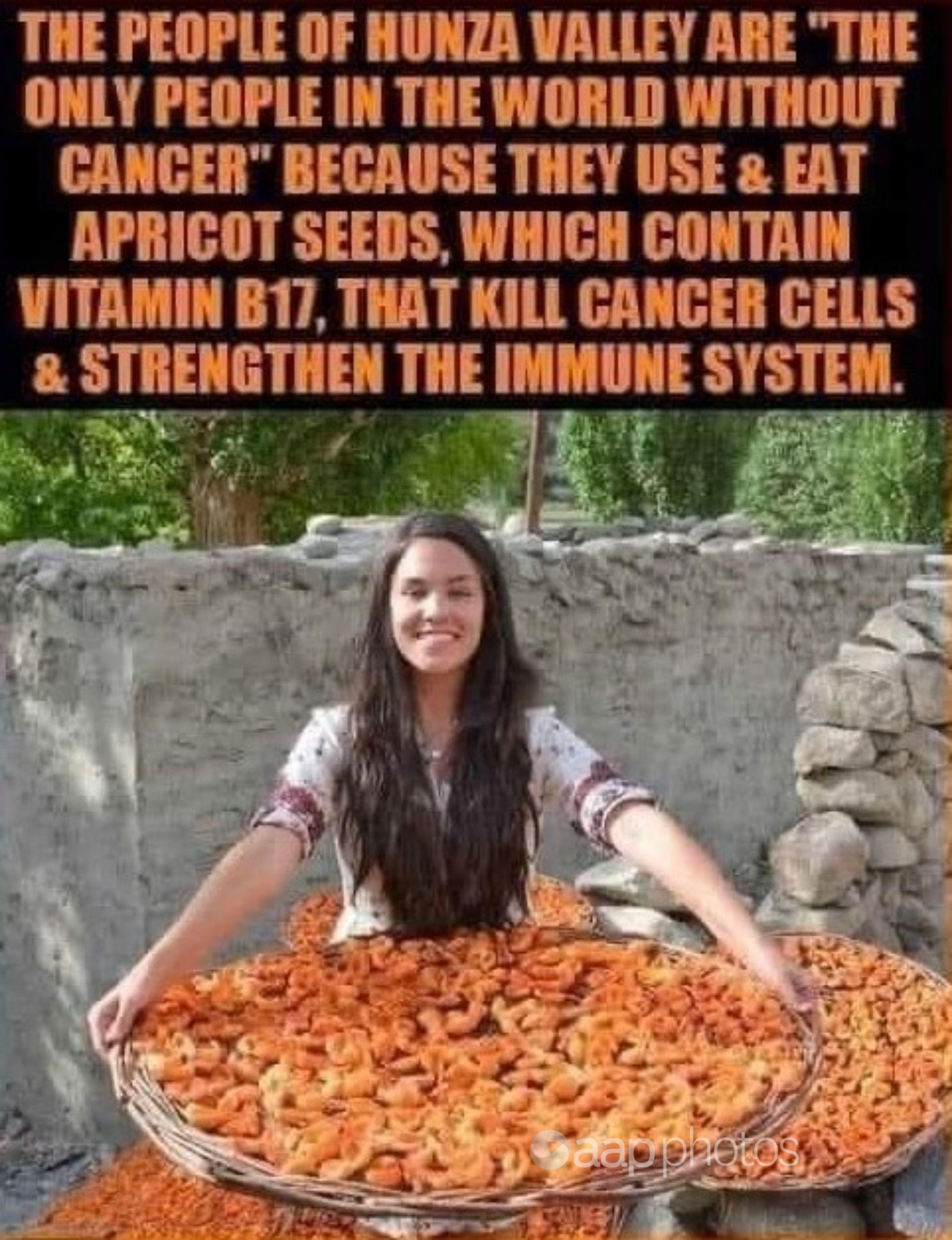The Statement
A Facebook meme claims that people from Pakistan’s Hunza Valley are the only cancer-free population in the world, putting the remarkable health outcome down to their consumption of apricot seeds.
The April 13 post shows a woman holding a large tray of pitted apricots beneath the statement: “The people of Hunza Valley are ‘the only people in the world without cancer’ because they use & eat apricot seeds, which contain vitamin B17, that kill cancer cells & strengthen the immune system.”
The meme was posted by the page Nikola Tesla Cause, which has over one million followers. The post had been shared more than 140 times, including by New Zealand users, attracting more than 43,000 views and 420 reactions at the time of writing.
Similar memes using the same image have appeared online for several years and it has circulated on social media since at least 2016, attracting thousands of reactions. The image also features in an online meme library.

The Analysis
Claims that the people of Pakistan’s Hunza Valley live exceptionally long lives and enjoy unusually good health have been made for decades. However, there’s no credible evidence that those living in the area are cancer-free, and multiple reports found they were not especially long-lived.
The health of the Hunza people has been the subject of multiple books since at least 1948, and their diet has also been used to market products that claim to promote longevity.
Nevertheless, AAP FactCheck was unable to find any studies on the presence of cancer in people from the valley.
An article by public health professor Dr William Jarvis, titled HelpingYour Patients Deal with Questionable Cancer Treatments and published in an American Cancer Society journal in 1986, said it was a myth that there were “cancer-free societies living in the world” (page 294).
The article said the Hunza people were “usually referred to by proponents of this myth” but early reports of the absence of cancer in the valley could not be verified due to the lack of medical facilities in the area. However, it said a team from Kyoto University visited the valley in the mid-1950s and found some inhabitants had cancer.
It also said that Pakistan’s embassy confirmed cancer was present in the population. “It is a fact that all living things — both plant and animal — get cancer,” Dr Jarvis wrote at the time.
A 2012 article in Smithsonian Magazine also said claims of the longevity of the Hunza people “contradicted the truth” and “remain apocryphal”. Some of the claim’s most vocal proponents had never visited the valley, while a Japanese doctor who attended the region reported rampant signs of malnutrition and poor health among inhabitants, the article noted.
The claim that apricot seeds contain “vitamin B17”, which kills cancer cells and strengthens the immune system, is not supported by medical evidence — and eating the seeds can cause serious harm.
According to the US National Cancer Institute (NCI), the pits of some fruit, including apricots, contain a chemical called amygdalin – also called laetrile when in a purified form – which has been marketed as “vitamin B-17” but it is not an approved supplement.
The NCI said laetrile gained popularity as an anti-cancer treatment in the 1970s, but it has “shown little anti-cancer activity in animal studies and no anti-cancer activity in human clinical trials”.
It said there have been no reported controlled clinical trials of laetrile and anecdotal and case reports had provided “little evidence to support (it) as an anti-cancer treatment”.
Laetrile was banned from interstate sale by the US Food and Drug Administration (FDA) in the 1970s. The organisation has since taken repeated court action to stop laetrile being sold as a cancer treatment.
Cancer Research UK says “claims that laetrile or amygdalin can treat cancer are not backed up by research”.
“Although, more recent studies have shown that laetrile can kill cancer cells in certain cancer types, there is not enough reliable scientific evidence to show that laetrile or amygdalin can treat cancer,” its website says.
A 2015 review, published by the Cochrane Library, examined studies that looked at the efficacy of laetrile and amygdalin for cancer treatment and found “claims that laetrile or amygdalin have beneficial effects for cancer patients are not currently supported by sound clinical data”.
However, it said taking amygdalin or laetrile involved “a considerable risk of serious adverse effects from cyanide poisoning” as some chemicals converted to cyanide when digested.
“The risk-benefit balance of laetrile or amygdalin as a treatment for cancer is therefore unambiguously negative.”
The sale of raw apricot kernels was banned under the Australia New Zealand Food Standards Code in 2015 after they reportedly caused cyanide poisoning in Australia, New Zealand, Canada, the United Kingdom and Europe.
New Zealand’s Ministry for Primary Industries says apricot seeds are unsafe to eat due to the presence of amygdalin. Three people in NZ were admitted to hospital as a precaution after eating raw apricot kernels in 2020. Similarly, a 67-year-old Australian man was taken to hospital with cyanide poisoning after taking the kernel extract to beat cancer.
University of Adelaide health and medicine professor Ian Olver, a former CEO of the Cancer Council Australia, told AAP FactCheck there had been anecdotes about the benefit of “B17” for decades, but there was no robust research to back up the claims.
“How it is said to work is that it is broken down to cyanide which may be able to kill some cancer cells,” Prof Olver said in an email.
“Animal studies showed no effects or a slight effect on some cancer cells. However, there are no randomised studies which show benefit, and yet people who ingest too much can get cyanide poisoning which may be fatal.
“So in summary, B17 isn’t a vitamin, has no documented randomised trials of anti-cancer activity and can cause cyanide poisoning.”
Jenelle Loeliger, head of nutrition at the Peter MacCallum Cancer Centre, said in an email “there is no evidence to support the consumption of vitamin B17” to treat or prevent cancer.
She directed AAP FactCheck to a Cancer Council website, which says there is no evidence that chemicals found in apricot kernels, including amygdalin or laetrile, can cure cancer.
“Despite decades of research, dating back to the 1950s, there is no evidence that laetrile can treat tumours in animals,” the website says. “Clinical trials in humans have also failed to find any benefits.”
The Verdict
There have long been claims that people from Pakistan’s Hunza Valley are exceptionally healthy, but there is no conclusive evidence they are free from cancer. Pakistan officials have said cancer is present in the population.
A 2015 review of studies into amygdalin and laetrile – the active ingredient found in apricot seeds – found they weren’t effective for treating cancer and could cause cyanide poisoning. Australia and New Zealand have banned the sale of apricot seeds after a number of reported cases of poisoning.
The US National Cancer Institute says “vitamin B-17” is not an approved vitamin, and laetrile is banned as a cancer treatment by the FDA.
False – Content that has no basis in fact.
* AAP FactCheck is an accredited member of the International Fact-Checking Network. To keep up with our latest fact checks, follow us on Facebook and Twitter.
All information, text and images included on the AAP Websites is for personal use only and may not be re-written, copied, re-sold or re-distributed, framed, linked, shared onto social media or otherwise used whether for compensation of any kind or not, unless you have the prior written permission of AAP. For more information, please refer to our standard terms and conditions.


















